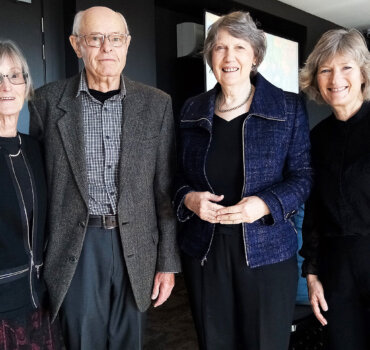
Helen Clark and Cambodia Charitable Trust (CCT) founder Denise Arnold, right, at the luncheon with Cambridge couple Linda and Barry Jackson.

Helen Clark and Cambodia Charitable Trust (CCT) founder Denise Arnold, right, at the luncheon with Cambridge couple Linda and Barry Jackson.
The potential for trafficking vulnerable girls is heightened in countries facing the dual dangers of abject poverty combined with the absence of a welfare safety net, says Helen Clark, particularly in a pandemic-stressed environment.
The former Prime Minister and global leader on sustainable development and gender equality was guest speaker at last Sunday’s Cambodia Charitable Trust (CCT) luncheon in Cambridge. The event, sponsored by Hidden Lake Hotel, was attended by over 50 people.
The Trust was established in 2008 by Tauranga-based lawyer and philanthropist Denise Arnold. Based on the premise that education is the key to breaking the poverty cycle and ending the child trafficking and slavery affecting thousands of Cambodian girls, it transforms schools, trains Cambodian teachers, sponsors children and supports communities to educate their children.
While the New Zealand team operates as volunteers, a team of eight are employed in Cambodia.
Ms Clark said she was attracted to support the work of the Trust because ‘Denise gets the bigger picture’, working in partnership with the Cambodian Government on education delivery, influencing the curriculum and training the teachers rather than limiting Trust activities to local level. “She is at each point of the chain … that is what will help bring about systemic change.”
‘If you cannot put food on the table, your adolescent girl becomes an asset.’ – Helen Clark.
She said Cambodia’s history of conflict and limited economic base meant the pandemic had applied additional challenges, particularly as Covid cases increased.
“It has an informal economy of about 70 percent… it’s hard to enforce lockdown where there is no social safety net. If you cannot put food on the table, your adolescent girl becomes an asset.”
Denise Arnold was driven to establish CCT after researching the levels of poverty, child sex trafficking and slavery in Cambodia. After her daughter returned safely from a school trip to the country, she felt compelled to help Cambodian parents and counter conflict-driven prejudice against education.
“The stories are incredibly tragic. I didn’t want to be the ambulance at the bottom of the cliff; I needed to be the fence at the top,” she said. “Given ongoing support, this has the capacity to change Cambodia’s education system in a short space of time and transform the lives of those who once had no hope.”
The Trust supports education for vulnerable children, especially girls, many of whom are trafficked for sex or sold into early marriage. It supports impoverished families to keep their children in education.
CCT currently sponsors about 400 children, supports 23 schools in Cambodia, and runs programmes in 17 teacher training colleges around the country. The first five sponsored children have completed their schooling and tertiary education.
Cambridge couple Linda and Barry Jackson, who have supported the Trust over the past couple of years, emceed the luncheon. All funds raised from the event will go directly to Trust projects in Cambodia.
More information is from www.cctnz.org.nz.








